Professor Winston Suite on the Nelson Island Experience
Tubal Uriah Butler: Nelson Island Experience
Activist Clive Nunez on the Nelson Island Experience
Maureen Searles on the Nelson Island Experience
Professor Winston Suite, chairman of the National Trust, Trinidad and Tobago transcribed Interview:
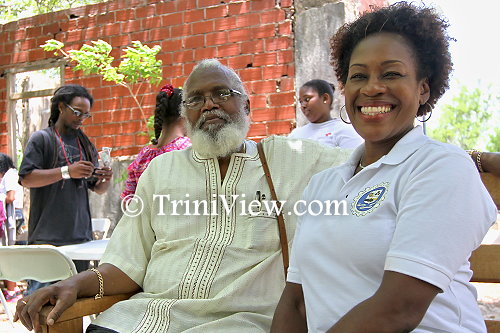
Professor Winston Suite and a student from the Cipriani Labour College at the “Tubal Uriah ‘Buzz’ Butler: Nelson Island Experience” event
Nelson Island is one of what we call “The Five Islands” which is just about fifteen minutes by boat off the wharf here, or the port. Nelson Island has an interesting history in that it was used first as a recreation or vacation setting for the so-called wealthy of the society many years ago in its early history, like most of the other five islands. But in relatively recent times … let us go to the indentureship of East Indians which began in 1845. The first set of Indians that came, came at the port here and for about twenty years until 1866. This is where they came, at the port.
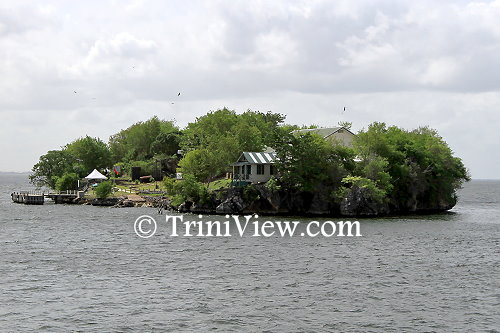
Nelson Island which lie west of Port of Spain in the Gulf of Paria
[The Indians were brought to] Nelson Island where the whole process of evaluation—that is,sorting [out]those who had illnesses or not well enough to move, were quarantined literally on the island. So there was a small hospital there. But they were kept there generally a couple weeks or so before they were processed, documented and taken to the various estates of mainly Trinidad at that time. This is one of the issues that we celebrated last month when we spoke about the “Indian Arrival: The Nelson Island Experience”. We focused on the arrival of Indians here which is very reminiscent of Ellis Island off New York which was a sorting centre for the Europeans who came from New York into the United States, of course, under different conditions. But that is the similarities and that’s what we celebrated some few weeks ago.
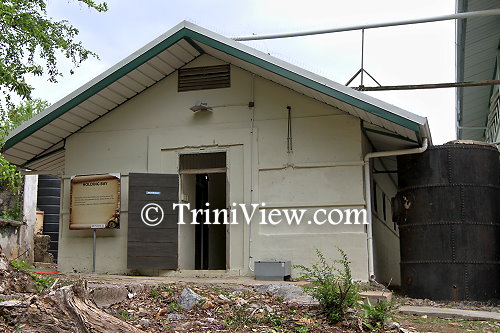
The Holding Bay on Nelson Island. It was used to house the activists who were detained on the island
Prior to that, we celebrated another dimension or aspect of Nelson Island which is Nelson Island as a detention centre for political undesirables, or who the government stated at the time [were] dangerous or problematic, and we celebrated the 1970 detention of more or less a hundred people for the better part of about six or seven months. So we commemorated that aspect of Nelson Island.
Nelson Island has another dimension that is also reminiscent of three other off-shore islands. One is the Robben Island where Nelson Mandela was detained for some twenty something years. We also had, for instance, Devil’s Island, which is an island off the coast of French Guyana (now Cayenne), where they put Dreyfus, the famous French Jew who was conspired against and charged with plotting against the state. After he was there for quite some time, a couple of years, he was tried again and found innocent … very famous in the history of human rights and justice.
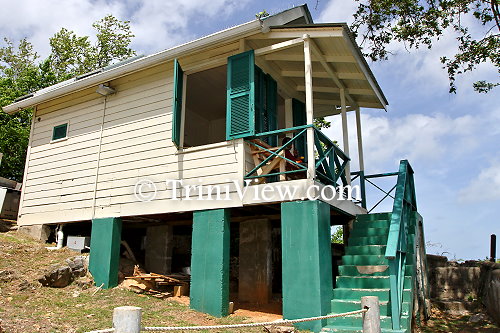
The reconstructed cottage which Butler occupied while he was imprisoned on Nelson Island from 1939 to the end of the Second World War in 1945
The other thing that we remember is the detention of Napoleon himself on Elba Island. But be that as it may, these are the different aspects. A detention centre for political undesirables, a prison for prisoners who are considered dangerous, and what you would call a decanting centre for new inhabitants … new persons that come into the society. The fourth aspect is what I started to talk about first, which is Nelson Island as part of a recreation centre for the rich and well-off in the society. We are not commemorating that now at this time; possibly at some later date.
What we are focusing on today and tomorrow, is that prison aspect; [the] off-shore prison aspect [in] which Tubal Uriah ‘Buzz’ Butler was detained towards the end of 1939 with the outbreak of the Second World War to the end of the war in 1945. When you go on the island, you will see the cabin which is a reconstruction, a restoration of a cabin in which Tubal Uriah ‘Buzz’ Butler was detained. These are the different aspects about Nelson Island that we have commemorated in the three events that we staged over the last three months.
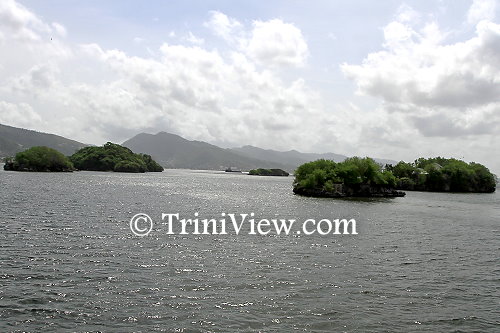
View of the five islands which lie west of Port of Spain in the Gulf of Paria
We believe that Nelson Island has a very important part in our history. …So many Trinidadians and Tobagonians know very little, not only about the country Trinidad and Tobago, but particularly the off-shore islands … and there are thirteen of them. You have the five islands which are small, and the larger ones—Carrera, Chacachacare, Monas etc.—further out that takes a little to get to see. lt is about first teaching Trinidadians about their own country, getting to know you.
Nelson Island has fallen under the jurisdiction of the Nation Trust and we are responsible for its upkeep and development. That is in the Act that sets up Nelson Island as the protector of the National heritage, and Nelson Island constitutes a significant part of our national heritage that goes back more than three hundred years.
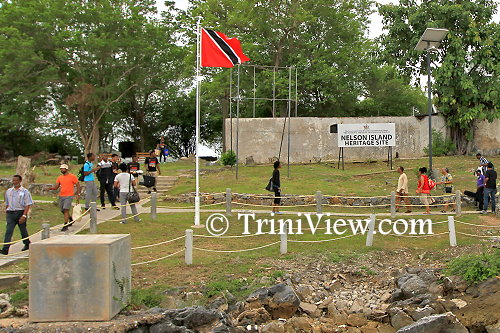
Visitors on Nelson Island
We plan to make Nelson Island a permanent museum that Trinidadians and Tobagonians and [other] visitors, what you call extra-Caribbean tourists, will be brought to or maybe encouraged to want to visit as a site. Right now, what we are contemplating is not only the provision of the physical infrastructure, but capturing of artifacts, a full museum concept of the period. Nelson Island, in its early days, was the forerunner of a fort. When they found that it wasn’t serving that purpose, they discontinued expansion of Nelson Island as a fort to protect the population on the island, and they moved and built Fort George. So this is part of the history that Trinidadians need to be made familiar with.
Tubal Uriah ‘Buzz’ Butler was the main detainee in the thirties.
The following is a list of people who were detained on Nelson during the Black Power Movement. Twenty of them have passed:
Nelson Island Detainees – 1970
Abdul Malik – (Delano De Coteau)
Adrian Espinet
Aiyegoro Ome – (David Murray)
Anthony MacFarlane
Apoesho Mutope – (Patrick Knight)
Bayliss Frederick
Brian Chen
Carl Blackwood
Carl Douglas
Carlos Williams
Chan Maharaj
Clive Nunez
Darwin Lewis
Dedan Kimathi – (Rolston Grainger)
Dupont Ewing
Errol Balfour
George Weekes
Gerald Bryce
Glenford George
Hector Greig
Hilton Greaves – (Swallow)
Hugo Piechier – (Big Sarge)
Ian Richardson – (Pimpo)
John McKarm
Julian Britto
Kelshall Bodie
Khafra Kambon – (Dave Darbeau)
Leroy Rattan
Lester Efebo Wilkinson – (Lester Wilkinson)
Makandal Daaga
Mervyn Quinn Huggins
Michael Als
Michael Phillips
Nuevo Diaz
Otto Patrick
Pat Emmanuel
Rudolph Lord (Mansa Musa)
Stanley Antoine
Syl Lowhar
Urban Mason – (Blackboy)
Vibert Harriet
Victor Marcano
Wayne Davis
William Benjamin – (Benjie)
William Duncan – (Turkey)
William Rivierre – (Bill)
Winston Leonard
Winston Pierre – (Kastro)
Winston Smart
Winston Suite
Also Read:
Tubal Uriah Butler: Nelson Island Experience
Activist Clive Nunez on the Nelson Island Experience
Maureen Searles on the Nelson Island Experience
Uriah Butler – Nelson Island Experience in pictures:
www.triniview.com/gallery/main.php?g2_itemId=827189